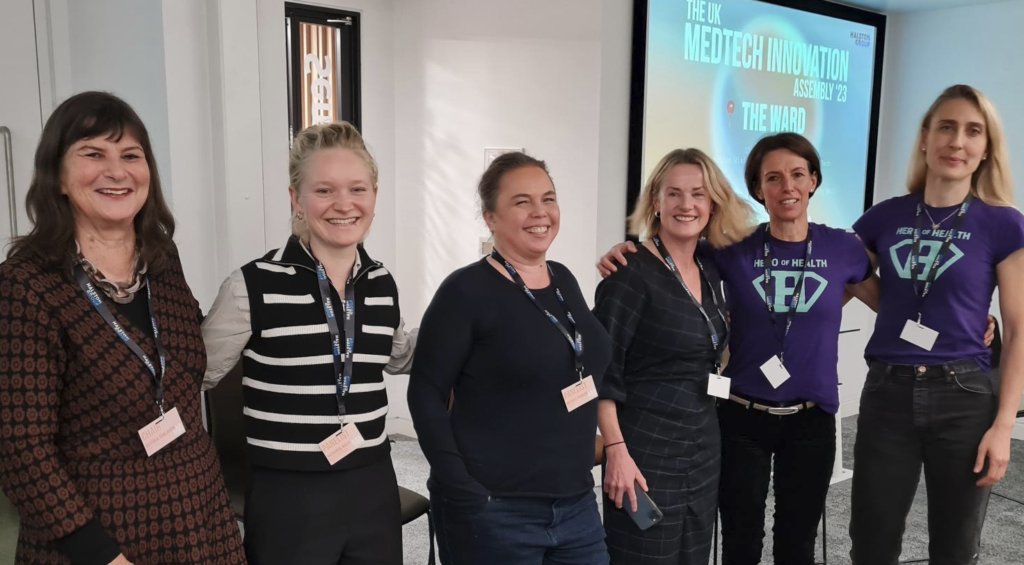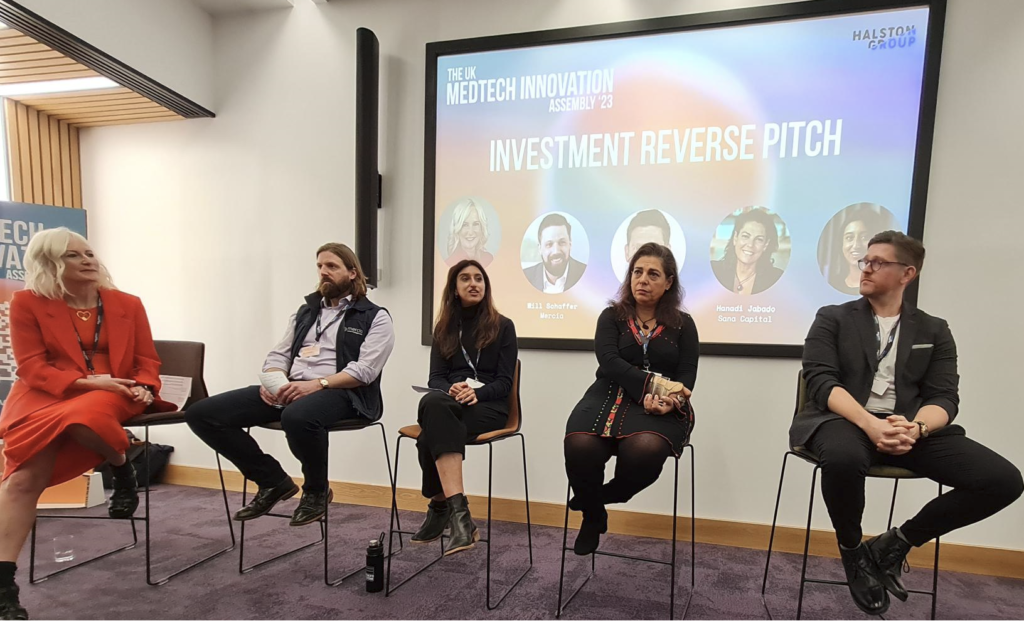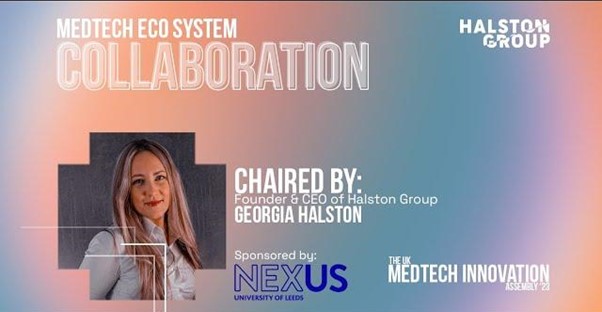Agetech – solving society’s biggest problems of the next century?
7 November 2023 By Victoria Tomlinson

What a week last week was! We launched our online platform and in the middle, I was asked to chair a panel on agetech at the Medtech Innovation Assembly at Nexus, part of the University of Leeds. It was brilliant and my panel truly inspiring – all have created tech to help some of the challenges of ageing.
First the panel and their tech (and I am going to apologise now – I know I have not done justice to some of these techs. It all sounded so logical and amazing when the speakers were explaining their products – but so hard to explain again now! And I can’t find what I hoped on the internet. My apologies).
- Dr Coco Newton is a cognitive neuroscientist and developing tech to detect Alzheimer’s way earlier than currently – so early, before there are any visible signs
- Rachel Francine is based between Los Angelos and the UK. She is chief exec of SingFit – a therapeutic music app for older adults, including those living with dementia. AI listens to and engages around music they know, engaging the brain and lifting moods
- Dr Rachel Young is a neurological physiotherapist co-designing power-assisted technologies to help people who have had brain injury, especially strokes
- Drs Linda Mizun and Wendy Stammers from Heroes for Health are creating community centred groups to help people find purpose, get fit and eat healthily. Their results are phenomenal with reversals in pre-diabetes and fatty liver disease in just months
And of course, our platform, Rethink Retirement, helps people start thinking and planning their futures before they retire from corporate life. It helps them to think about purpose at this next stage, the need to make new connections – and practical ways to do this – as well as an understanding of the mental and physical health adjustments.
We are seeing people really motivated as they retire – which will lead to ten years more ‘engaged life’, reduce isolation and loneliness leading to ill health; and reduce the chances of Alzheimer’s by 2.5x.
Between us all, these technologies can make a massive difference to the individuals and society.
I was struck, hearing all these wonderful innovations, about how little people think about their long term futures or the possibility of living to 100 years old. We have got to get people in their 40s and 50s thinking about this (earlier still is better but let’s start where it is realistic).
Our GPs, Linda and Wendy, shared stats that one in four older people is lonely and one in five has no connections – with family or friends. They are talking about older people – I think in their 70s and 80s and more. But this loneliness starts when people retire. Few understand how much of their social interactions and friendships are tied up with work. Everyone says this is about men, but we have seen plenty of women who are unbelievably lonely when they leave work, especially if they have never married or had children.
Loneliness means people don’t eat well, they generally don’t exercise as much and this all leads to early onset of serious illnesses.
The cost to the NHS is horrendous, as can be seen. Loneliness and its impact is costing the NHS £100bn a year – and the cost to the economy is £200bn.
Agetech is not geeky, nice to have or about the latest gadget. This is fundamental to changing the health of our nation (and world) and achieving our passion – changing older people from being a cost and drain to a net contributor. Our experienced generations have masses of skills and expertise that can help society from entrepreneurs to children at school.
The other session I was able to join was the Investment Reverse Pitch.

Helen Oldham chaired this. She is an angel investor – among other things – and her panel included
- Will Schaffer, investment director at Mercia Asset Management
- Khadija Ashfaq, investment manager at Northern Gritstone
- Hanadi Janabo, managing partner of Sano Capital
- Daniel Rooke, co-founder and partner, Start Codon
Some of the topics discussed on this panel
- The current challenges in the tech industry and how the (often ridiculous) valuations are not there now. Probably as well? But against this, the north is a great place for tech – Wired reports that Leeds tech sector is growing 9.9% against a national decline of 0.6%.
- Lot of discussion about getting medtech products into the NHS
- Don’t think of the NHS as one organisation; every Trust is different and you need to know the lifecycles of the different parts of the NHS
- For all the challenges of the NHS, it sounded more positive than selling in the States where there is a big focus on, ‘who will pay for this’ – and of course that means the health insurance companies
- The investors were challenged about how diverse their teams are. They gave robust answers and this particular group of investors were proud of the diversity of their leadership teams and investees
Jane Kennedy, chief business officer at Discovery Park in Kent (on the old Pfizer site) was delighted to meet so many female and other medtech founders – she is organising a major conference next year and was on the look-out for speakers!
In an interesting twist, Liz Leggott who is project manager for the SYB Primary Care Workforce & Training Hub, said she was looking for funding to pilot/test medtech products for the NHS. Because of NHS budget constraints, her funds have been cut. I am not sure the panel had answers on this, but this is such a good idea to get the evidence needed.
I have only now registered that our Agetech panel was all female – not sure what it says but it is fantastic to see women spotting and solving many of society’s biggest challenges.

The final word has to go to Georgia Halston and her team for coming up with the idea for this event and organising it. There must have been several hundred people, world class speakers and bringing together those in Medtech and the investment community. Well done Georgia – great event to do and you did it brilliantly.


